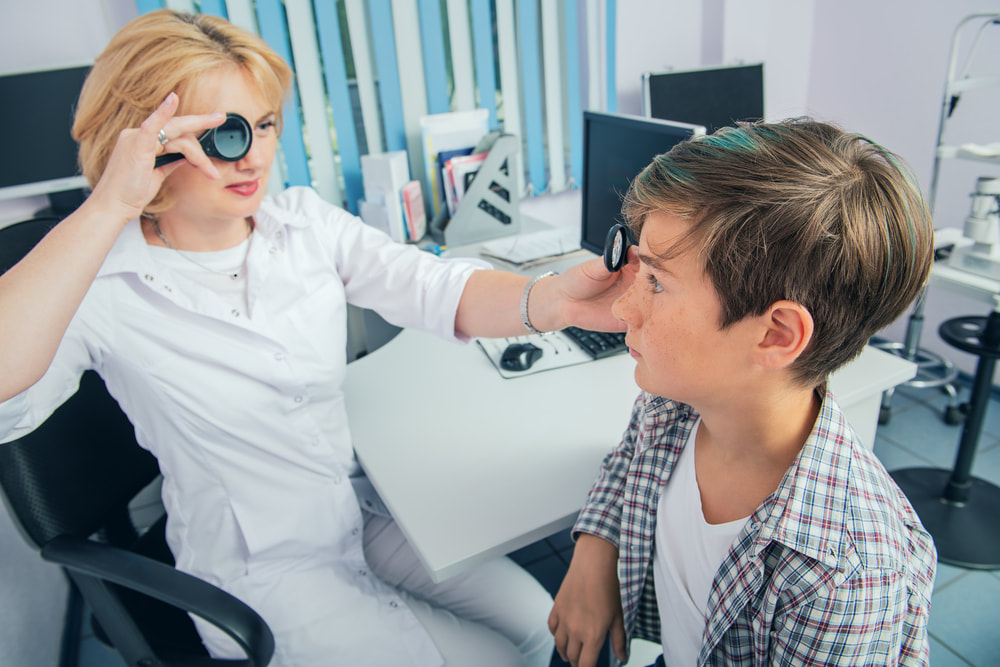Serious eye problems, such as glaucoma, are rare in children, but other conditions, including infections and refractory errors, are common. Most common eye problems in school-age kids are easily treated. Below are some of the most common eye conditions in school-age children, their symptoms, and treatments. Lazy EyeLazy eye, which is medically called amblyopia, involves a chronically misaligned eye. The eye may turn out, in, down, or up. According to the American Academy of Ophthalmology, a lazy eye is a common condition in childhood. The eye that wanders tends to be weaker than the other eye. It is essential to diagnosis a lazy eye as soon as possible to prevent any vision issues from developing. Symptoms of a lazy eye include the following:
A lazy eye is often treated by using an eye patch. The patch is worn over the stronger eye to allow the wandering eye to strengthen. ConjunctivitisConjunctivitis involves an inflammation of the white part of the eye. It is often called pink eye because it causes redness in the eye. One or both eyes may be affected. Conjunctivitis is easily transmitted. According to Stanford Children’s Health, its common for large outbreaks of conjunctivitis to occur in daycares and schools. It can develop as a result of a viral or bacterial infection. Symptoms of pink eye include:
Treatment for conjunctivitis depends on whether it occurs due to a viral or bacterial infection. Viral infections do not usually require any special treatment. Infections caused by bacteria are treated with antibiotic eye drops. Refractory errorsRefractory errors occur when the shape of the eye interferes with the correct bending of the light. School-age children may have different types of refractory errors. One of the most common refractory errors in school-age kids is nearsightedness. Children that are nearsighted have trouble seeing objects that are far away. Most refractory errors are treatable with glasses. If your child needs glasses, remember their eyeglass prescription may change as they grow older. Regular visits to the eye doctor are important to make sure the glasses are optimal for your child’s vision. Eye allergiesEye allergies are very common in school-age children. Common allergens may include pollen, mold, and grass. Although eye allergies do not affect your child’s vision, they can be bothersome and uncomfortable. Symptoms of eye allergies in children include:
At-home care for eye allergies may be enough to treat the problem. If possible, try to determine what your child is allergic to and decrease exposure. It’s also advisable to wash allergens off the face as soon as coming in from outside. Use a washcloth to wipe off the eyelids and face or encourage your child to take a shower to get pollen and other allergens off their eyes. Use antihistamine eye drops after talking to your child’s doctor to be sure they are appropriate. Over the counter allergy medication may also be an option to ease symptoms. For itchy eyes, try placing a cool washcloth over the eyes to reduce irritation. We hope the information above was helpful in identifying common eye problems in school-age children. We are happy to answer any questions. To discuss whether an appointment with one of our eye doctors would be appropriate at this time, please call our office at 508-746-8600. Comments are closed.
|
EYE HEALTH BLOGCategories
All
Archives
April 2024
|
|
Kadrmas Eye Care New England
55 Commerce Way, Plymouth, MA 02360
14 Tobey Road, Wareham, MA 02571 133 Falmouth Road (Rt 28), Mashpee, MA 02649 |
Phone Number:
1-508-746-8600 Hours: Monday through Friday — 8 AM – 4:30 PM |


 RSS Feed
RSS Feed
